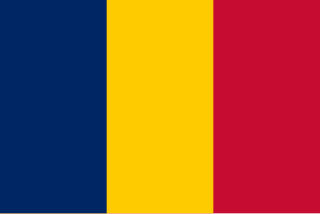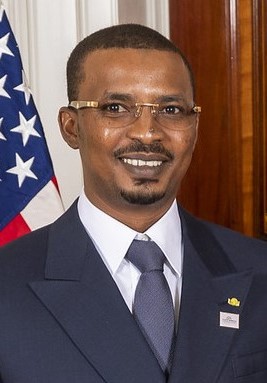Related Research Articles
Chad, officially the Republic of Chad, is a landlocked country in Central Africa. It borders Libya to the north, Sudan to the east, the Central African Republic to the south, Cameroon and Nigeria to the southwest, and Niger to the west. Due to its distance from the sea and its largely desert climate, the country is sometimes referred to as the "Dead Heart of Africa".

Chad, officially the Republic of Chad, is a landlocked country located at the crossroads of North and Central Africa. It is bordered by Libya to the north, Sudan to the east, the Central African Republic to the south, Cameroon to the southwest, Nigeria to the southwest, and Niger to the west. Chad has a population of 16 million, of which 1.6 million live in the capital and largest city of N'Djamena. With a total area of around 1,300,000 km2 (500,000 sq mi), Chad is the fifth-largest country in Africa and the twentieth largest nation by area in the world.

Polygyny is a form of polygamy entailing the marriage of a man to several women. The term polygyny is from Neoclassical Greek πολυγυνία (polugunía); from Ancient Greek πολύ (polú) 'many' and γυνή (gunḗ) 'woman, wife'.
Polygamy is the practice of marrying multiple spouses. When a man is married to more than one wife at the same time, it is called polygyny. When a woman is married to more than one husband at the same time, it is called polyandry. In sociobiology and zoology, researchers use polygamy in a broad sense to mean any form of multiple mating.

In a culture where only monogamous relationships are legally recognized, bigamy is the act of entering into a marriage with one person while still legally married to another. A legal or de facto separation of the couple does not alter their marital status as married persons. In the case of a person in the process of divorcing their spouse, that person is taken to be legally married until such time as the divorce becomes final or absolute under the law of the relevant jurisdiction. Bigamy laws do not apply to couples in a de facto or cohabitation relationship, or that enter such relationships when one is legally married. If the prior marriage is for any reason void, the couple is not married, and hence each party is free to marry another without falling foul of the bigamy laws.

Idriss Déby Itno was a Chadian politician and military officer who was the 6th president of Chad from 1991 until his death in 2021 during the Northern Chad offensive. His term of office of more than 30 years makes him Chad's longest-serving president.

Marriage law is the body of legal specifications and requirements and other laws that regulate the initiation, continuation, and validity of marriages, an aspect of family law, that determine the validity of a marriage, and which vary considerably among countries in terms of what can and cannot be legally recognized by the state.
Polygamy is the practice of having more than one spouse at the same time. Specifically, polygyny is the practice of one man taking more than one wife while polyandry is the practice of one woman taking more than one husband. Polygamy is a common marriage pattern in some parts of the world. In North America, polygamy has not been a culturally normative or legally recognized institution since the continent's colonization by Europeans.
Religion in Guinea-Bissau is diverse, with no particular religion comprising an absolute majority of the population. Islam is the most widely professed faith, and significant populations of Christians and adherents of traditional African religions are also present in the country.
As Yemen is a mostly-Muslim nation, polygamy is lawful. Polygamy is permissible in Islam up to four wives, as long as the husband devotes equal attention to each of them.

Under civil law, Nigeria does not recognize polygamous unions. However, 12 out of the 36 Nigerian states recognize polygamous marriages as being equivalent to monogamous marriages. All twelve states are governed by Sharia law. The states, which are all northern, include the states of Bauchi, Borno, Gombe, Jigawa, Kaduna, Kano, Katsina, Kebbi, Niger, Sokoto, Yobe, and Zamfara which allows for a man to take more than one wife.
Polygamy in Mali is legal and frequently practiced.
Polygamy is legal in Indonesia, the largest Muslim population in the world. Polygamy in Indonesia is not just practiced by Muslims, but also customarily done by non-Muslim minorities, such as the Balinese and the Papuans.
The legal status of polygamy varies widely around the world. Polygamy is legal in 58 out of nearly 200 sovereign states, the vast majority of them being Muslim-majority countries. Some countries that permit polygamy have restrictions, such as requiring the first wife to give her consent.
Polygamy and civil polygamous marriages are legal in Bangladesh but restricted according to a law of 1961, though the practice is rapidly declining. According to a Pew Research Center study, less than 1% of Bangladeshi men are in polygamous marriage, much lower than the average rate found in other nations that permit polygamy. Certain cities have also placed hefty taxes on the practice of polygamy, with the tax increasing per each new wife the man takes. A Bangladeshi Muslim man can marry up to four wives at the same time but must have permission from existing wives. There is no known limit for the number of wives a Hindu man can take in Bangladesh.
Polygamy is illegal in Ghana, but the restrictions are not heavily enforced. Polygamous marriages are illegal under civil law, though are arguably considered to be legal under customary law. Despite these exceptions, there have been no reports of a legally contracted polygamous marriage in Ghana; and are considered to be "de facto" illegal. An estimated 22% of Ghanaian women live polygamously.

Women in Chad, a landlocked country in Central Africa, are the mainstay of its predominantly rural-based economy and they outnumber the men. Chad is a country with diverse and rich cultural practices, such as male beauty pageants and long-kept-secret hair products. Despite their numbers in the general population, there are very few women in governmental positions and gender equality is far from being a reality in Chad. Chad is rated by the World Bank as the third least gender equal country in Africa. Additionally, there are few women who attain higher education, and many who receive a college degree do so outside of the country.

Mahamat Idriss Déby Itno is a Chadian politician and military officer who has been the leader of Chad since 2021, first as President of the Transitional Military Council from 2021 to 2022, then as Transitional President from 2022 to 2024, and then as the 7th President since 2024 following his victory in the presidential elections. He is widely known in Chad by his nickname Kaka. He is also the General Secretary of the Patriotic Salvation Movement since 2022. He gained power on 20 April 2021, succeeding his father and predecessor, Idriss Déby, who died in action while commanding troops in the Northern Chad offensive. He previously served as the second in-command of the military for the Chadian Intervention in Northern Mali (FATIM).
Polygamy in Guinea is generally illegal. Polygamy is regulated under the new 2019 family law. The new regulations stipulate that a marriage is presumed to be monogamous; however a couple may legally enter into a polygynous marriage if the groom declares that he is opting for polygyny during the marriage ceremony and the bride gives "explicit consent". The new law is the result of a long legislative battle between those who wanted free polygamy without restrictions and those who wanted a complete ban.
Polygamy is legal in Egypt, but not common.
References
- ↑ "Chad". Social Institutions and Gender Index. Archived from the original on Jun 19, 2010.
- ↑ Kramer, Stephanie (2020-12-07). "Polygamy is rare around the world and mostly confined to a few regions". Pew Research Center. Retrieved 2024-04-22.
- ↑ Kramer, Stephanie (2020-12-07). "Polygamy is rare around the world and mostly confined to a few regions". Pew Research Center. Retrieved 2024-04-22.
- ↑ Kramer, Stephanie (2020-12-07). "Polygamy is rare around the world and mostly confined to a few regions". Pew Research Center. Retrieved 2024-04-22.
- ↑ van Wyk, Jo-Ansie; Nyere, Chidochashe; Muresan, Arina (2018). "African First Ladies, Politics and the State". Politeia. 37 (2). University of South Africa Press.
- ↑ Tampa, Vava (2021-05-13). "Idriss Déby obituary". The Guardian. ISSN 0261-3077 . Retrieved 2024-04-22.
- ↑ "Tchad: voici qui est la nouvelle première dame du pays". 2021-08-03. Archived from the original on 2021-08-03. Retrieved 2024-04-22.